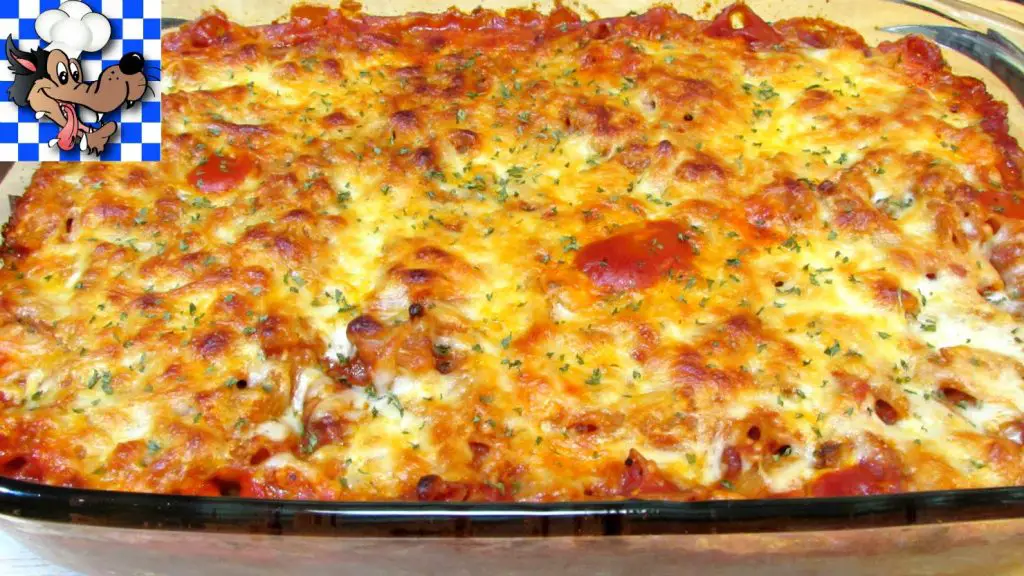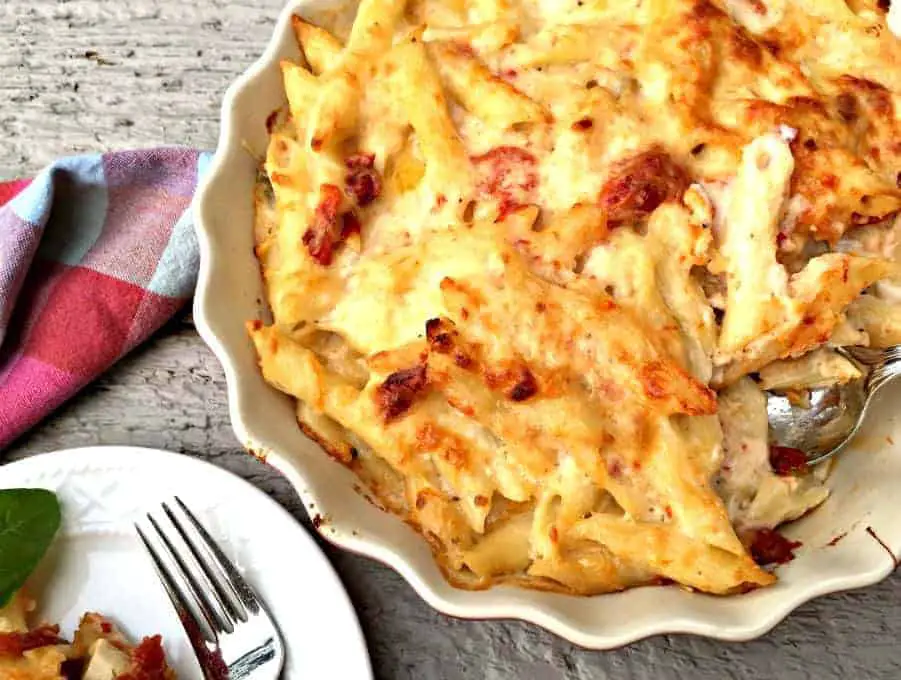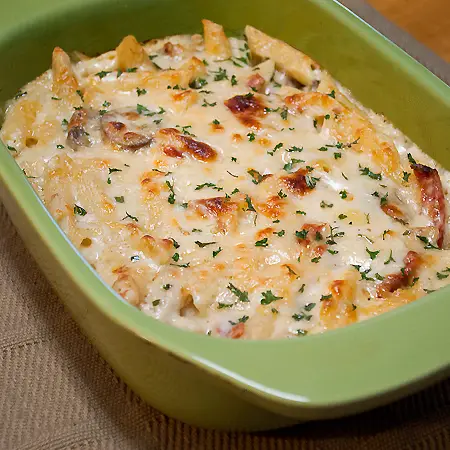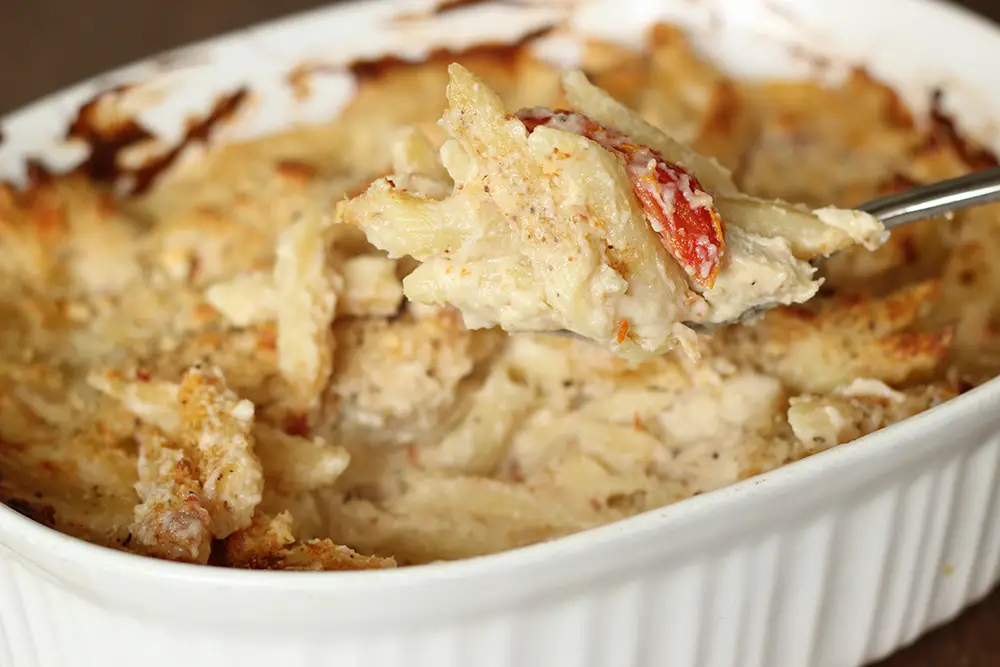This easy, healthy and tasty recipe will feed a family of 4 or more for only $10.63. Interested?
It doesn\'t matter if you chase or not for ingenious, economical and satisfying recipes, we all enjoy now and then eating well on low budget!
Who doesn\'t love a good Baked Cheesy Chicken Penne Pasta Bake recipe?
This dish is easy to make, and you can feed your family for days with just one batch.
The best part about this dish is that it\'s budget-friendly!
You\'ll spend just about $10 on ingredients, so there are no excuses not to give this recipe a try.
This casserole is the perfect balance between delicious and healthy.
It\'s not too heavy, yet filling enough that we don\'t feel guilty about eating a whole plateful of it ourselves!
Baked Cheesy Chicken Penne Pasta Bake
Do you want to eat well but don\'t have a lot of money to spend on food?
This Baked Cheesy Chicken Penne Pasta Bake will help you out!
It\'s an easy and delicious recipe that is perfect for weeknights.
The best part about this dish is that it can be made in advance and frozen, so when your time is limited you\'ll still get a healthy and satisfying meal.
It can be made with ingredients you already have in your pantry so you don\'t have to worry about going out shopping for something new.
This Baked Cheesy Chicken Penne Pasta Bake is a super easy, delicious meal that the whole family will enjoy.
It doesn\'t matter if you chase or not for ingenious, economical and satisfying recipes, we all enjoy now and then eating well on low budget!
Hopefully, you have all the ingredients already, if not, get ready to go to the store to get all the stuff.
This Baked Chicken and Penne Pasta Casserole recipe, courtesy of TheWolfePit , with all that pasta and all that cheesy goodness bubbling away, looks delicious and is a keeper in any recipe book.
So without any further ado, let\'s get started with today\'s recipe!
Baked Chicken And Penne Pasta Casserole
Ingredients
2 lbs – Skinless Chicken Thighs
45 oz – Spaghetti Sauce
16 oz – Penne Pasta
8 oz – Mozzarella Cheese
2 Cups – Water
This recipe for casserole will not only fill you up but it\'s also easy enough that your kids can help make them!
Simply mix-and-match ingredients until they come up with their favorite version. A simple way to dress things up a little is by adding some red pepper flakes or portobello mushrooms instead of the artichoke hearts (additional veggies).
You might even consider making this vegetarian if meat isn\'t on board in everyone’s household – just use penne pasta as mentioned previously and top off each serving before baking along side mozzarella cheese at its freshest during peak times like summer produce seasonality.
Not all pastas were created equal in this Baked Cheesy Chicken Penne Pasta Bake, rendering it with a nice crunchy quality.
You can also substitute your pasta of choice if you don\'t like the penne noodles – rigatoni would work well too!
This recipe is so easy to make and full of flavor that even the pickiest eaters will ask for seconds.
It\'s great on its own or served alongside some garlic bread or roasted vegetables – feel free to get creative when making sides!
It doesn\'t matter if you follow recipes literally (because there are no numbers) but try not to go overboard by adding/omitting ingredients because then it won’t be delicious anymore.
Get your full Baked Chicken And Penne Pasta Casserole printable recipe and helpful tips as well as many other delicious recipes at: TheWolfePit
Thanks to TheWolfePit for this amazing recipe and featured image.
More Baked Cheesy Chicken Penne Main Dishes
The best thing about these dishes?
They are so easy to make – no need to slave away in front of your oven all day long just because you want something good for dinner tonight…
Baked Pasta With Chicken And Tomatoes
It\'s time to make your favorite dish: cheesy chicken pasta!
This baked cheesy chicken pasta is comforting food at its highest!
It\'s packed with tender, oven-roasted tomatoes, and a creamy sauce.
You can make this dish in advance for when you need to feed your family fast or freeze it as well so that on those busy nights nothing will be getting cookin\'.
Baked Cheesy Chicken Penne
You won\'t believe this yummy dish!
A cheesy pasta blended with chicken, sun-dried tomatoes and mushrooms.
You can leave out the tomatoes if you like but I really liked them in there so go ahead and up their quantity for yourself or even add broccoli or asparagus tips instead of what\'s called for here too – whatevs your choice just make sure to keep enough food on hand since it makes two 2 quart dishes (use one now & store leftovers).
Chicken, Cheese and Penne Pasta Bake
You\'ve got to try this casserole for dinner.
It makes a wonderful, healthy meal with asparagus and salad!
You can mix up the cheeses if you want to add some extra flavor or switch out one of the veggies like artichokes with something new in order create even more variety at your table such as portobello mushrooms topped off by melted mozzarella cheese – yummo!!















